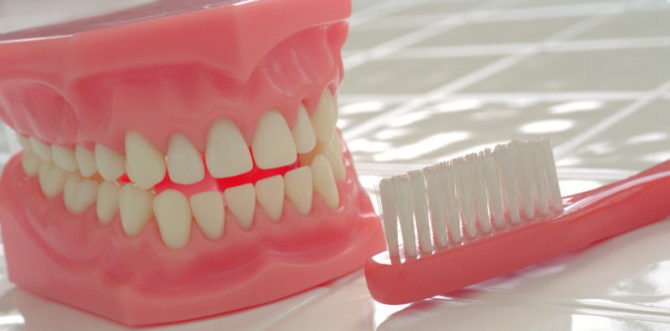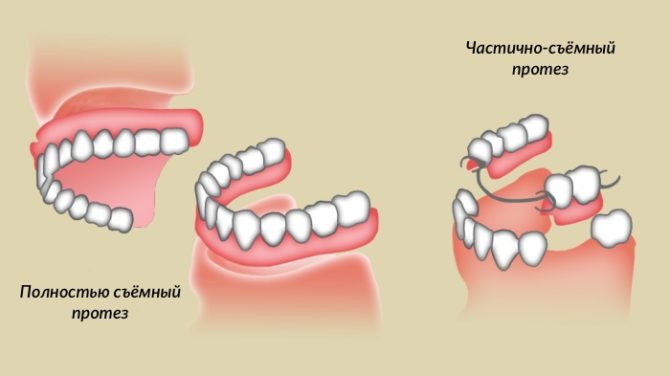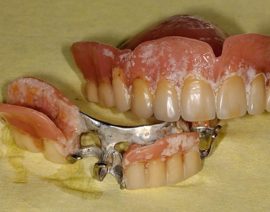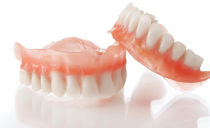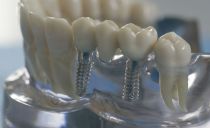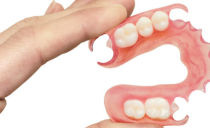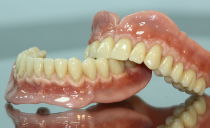Rules for caring for removable dentures, methods for storing prostheses
The demand for orthopedic structures made of acrylic and nylon is due to the high aesthetics of products, ease of use, and affordability. Proper care of removable dentures made of nylon or plastic and compliance with the principles of storage will maximize their lifeAvoid additional financial costs for repairs.
Content
General Description of Removable Dentures
Removable prosthetic products are installed with complete or partial loss of teeth and advanced forms of gum disease: periodontitis, periodontal disease. Such designs are classified into 3 groups:
- Partially removable structures. They are attached to the soft tissues of the oral cavity and preserved dental units. Involved in the absence of one or more teeth. They are classified into acrylic (inexpensive, light, fixed on hooks), as well as more expensive nylon and clasp. The latter represent a metal frame with artificial teeth and are installed in case of loss of a significant number of dental units.
- Conditionally removable. They eliminate minor defects and are used in the absence of one or more teeth.
- Completely removable products - nylon, plastic systems, manufactured taking into account the individual anatomical features of the patient's oral cavity and indicated for use with complete loss of teeth. They are attached using special suction cups or fixing agents: creams, powders, gels.
The advantages of removable orthopedic constructions over non-removable are ease of installation, relatively low cost. The main disadvantages are a possible manifestation of an allergic reaction to plastic material, the susceptibility of the prosthesis to deformation and damage. You can minimize the risk of allergies by choosing flexible nylon products for prosthetics. And to extend the life of the device helps to properly clean the system at home, following the advice of the dentist on the use of the product.
The principles of operation of prostheses
To properly care for installed removable dentures, you need to follow 3 important principles of their operation:
- an integrated approach to care - a combination of different cleaning methods;
- regularity of care - hygiene measures should be carried out daily, at the end of each meal;
- obligatory - even visually clean constructions require the elimination of an invisible accumulation of colonies of microorganisms, plaque.
Caring for plastic and nylon removable dentures is a multi-step procedure, the failure of which can lead to the development of a number of complications and the destruction of products.
The consequences of non-compliance with the rules for the care of dentures
Neglecting the rules of care and storage of removable dentures results in the development of inflammatory processes in bone and soft tissues of the oral cavity: gingivitis, stomatitis.The occurrence of pathologies causes the activity of infectious agents that accumulate in the porous structures of structures.
In the absence of timely hygienic treatment, loose bacterial plaque is mineralized and converted to tartar, which injures the gums. In parallel with the formation of dense deposits, an unpleasant, putrid odor from the mouth is felt, a carious process occurs. The latter can lead to the destruction of healthy dental units and their removal.
Inadequate care for an installed removable denture or a complete rejection of hygiene procedures adversely affects the state of the system:
- the product is getting dark, the spots appearing on it reduce the aesthetics of the device;
- the design begins to rub the mucous membrane of the oral cavity, until ulcers appear on it;
- the functional characteristics of the structure are reduced, its service life is significantly reduced.
Improper use of dentures leads to an unpleasant aftertaste in the mouth, disruption of the receptors - cells with microvilli.
Removable denture care products
Pharmacy chains offer a large number of drugs and devices for the care of dentures, carried out at home. All of them are classified as cleaning and fixing.
Cleaning and antibacterial agents: pastes, foams, tablets, liquids
Cleaning and antibacterial prophylactic agents include dental gels, pastes, express foams, disinfecting tablets and liquids. The composition of gels, pastes and foams should include antiseptic components.
The most popular cleansing gels are Curaprox BDC, Dentipur Gel. The list of special toothpastes used to clean dentures made of nylon or plastic includes Splat and Lacalut.
Specialized denture cleaners can be replaced with toothpastes for preschool children that do not contain abrasive substances. The maximum permissible concentration index of such ingredients is 20 units (an indicator indicated by the abbreviation RDA on the package).
Express foams are drugs used to quickly remove plaque from orthopedic structures. It is recommended to clean dentures with express foam using a soft toothbrush; before purchasing a brush, make sure Sensitive or Soft is on it.
The composition of tablets for the preparation of special solutions for cleaning prosthetic structures includes proteolytic enzymes, oxidizing agents: sodium perborate, potassium persulfate. The most popular goods of this category are R.O.C.S., Dentipur, Corega.
The tablets are dissolved in 100 ml of boiled and cooled water. False jaws are immersed in the resulting antiseptic for a period of 15 to 30 minutes, during which the liquid disinfects them, destroys pathogens, eliminates dark spots. After completion of aseptic measures, the prostheses are washed with clean water and dried. It is impossible to rinse the oral cavity with such an antibacterial agent.
Among dentists recommended by dentists for the care of prostheses is Corega. Such a solution helps to carry out high-quality deep cleaning of orthopedic products, to remove deposits of various densities from their surface.
It is recommended that you consult with your doctor about how to properly use these funds. Keep the preparations in a cool place.
Disinfection Accessories
To carefully clean the prosthesis from plastic or nylon at home, you need to use a special toothbrush with 2 types of bristles: a zigzag hard, convex soft. A special or children's non-abrasive paste is applied to the brush, the prosthesis is cleaned in smooth circular movements.
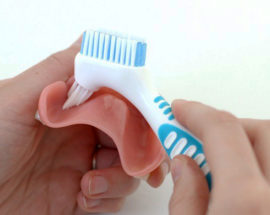 The minimum time required for high-quality disinfection of the structure is 10-15 minutes. The final stage of the aseptic action is rinsing the orthopedic structure and rinsing the brush. It is recommended to change the toothbrush to clean the prosthesis at least once every 30 days.
The minimum time required for high-quality disinfection of the structure is 10-15 minutes. The final stage of the aseptic action is rinsing the orthopedic structure and rinsing the brush. It is recommended to change the toothbrush to clean the prosthesis at least once every 30 days.
Disinfection of fixing elements (hooks) and interdental spaces of prostheses should be carried out using special brushes. Keep devices for cleaning orthopedic structures should be in places inaccessible to children, pets.
To properly care for dentures made of nylon or plastic, it is recommended to purchase a special device - an ultrasonic bath. The device is a container, the main elements of which is a device generating ultrasonic waves. The inserted jaw is placed in a special compartment, where it is ultrasonic processing. Ultrasound waves destroy plaque and dirt present on the surface of a removable prosthesis.
Fixative drugs
The list of care products for plastic and nylon removable dentures includes drugs used to fix structures: powders, special strips, creams.
The use of strips allows you to reduce the pressure of the dental structure on the gums. The powder is used in case of insufficient work of the salivary glands, it is applied to the product with a thin layer. In the absence of experience, it is difficult to use the powder correctly: difficulties are associated with the need for a uniform distribution of the substance.
Store the listed products in a place protected from high temperature and sunlight.
How to care for the false jaw
With proper care and use of dentures, the duration of their operation increases. Among the most important measures for the care of orthopedic structures is a high-quality disinfection.
The procedures for cleansing false teeth at home are conventionally divided into 2 types: daily, after eating.
Daily manipulation
Aseptic measures carried out before going to bed and after waking up allow preserving the functionality and appearance of dentures. Morning cleaning is carried out before putting on the prosthesis, evening - after removing it.
The principle of caring for inserted jaws is similar to the rules for the prevention of diseases of healthy teeth. All structural elements from nylon, plastic must be cleaned with a brush with paste. Particular attention is paid to the fixing elements: suction cups, hooks. It is permissible to replace the paste with dishwashing detergents, liquid soap.
Upon completion of hygienic manipulation, the denture is washed several times with boiled water, the temperature of which does not exceed 45 ° C. Do not use hot liquid; it can deform the product.
Before cleaning the prosthesis, it is necessary to lay a soft towel in the sink, which will help maintain the integrity of the structure in the event of an accidental fall.
As an antiseptic, you can use a classic mouthwash.
List of hygiene measures at the end of a meal
Removable dentures made of plastic, nylon and other materials need to be cleaned of food debris. If it is not possible to rinse the product in pre-boiled water, you can rinse your mouth with an antiseptic balm or ordinary tap water.
How to store dentures at home
When deciding how to store used dentures at home, you should remember: the traditional method of storage - in a glass with a special solution - does not provide complete immersion of the product in an antiseptic. To extend the use of the insertion jaw allows storage of the product in an opaque container having a tight lid and a separator bowl. The removable segment of the container helps to remove the prosthesis without touching the antibacterial solution.
Previously, orthopedic structures were stored in water, many still believe that they should be lowered into a glass of liquid for the night. However, modern products made of silicone and acrylic can not be kept in liquids - they do not crack and do not deform without constant moisture.
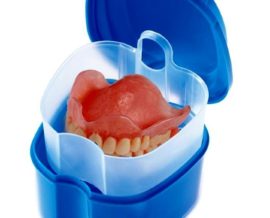 Some patients store dental designs in special cases to help keep them clean. For a short period of time, the prosthesis can be stored by wrapping it in a clean cloth. Consult with your doctor in advance about storage features of the used false jaw.
Some patients store dental designs in special cases to help keep them clean. For a short period of time, the prosthesis can be stored by wrapping it in a clean cloth. Consult with your doctor in advance about storage features of the used false jaw.
To extend the life of the orthopedic product, it is recommended that you visit the dental clinic twice a year, whose specialists will evaluate the current condition of the denture, and will carry out the necessary adjustment and bleaching of the structure. If you independently detect a defect, you should immediately consult a doctor for restoration of the product.
Subject to the above recommendations, the period of operation of all types of orthopedic structures will be as long as possible.

